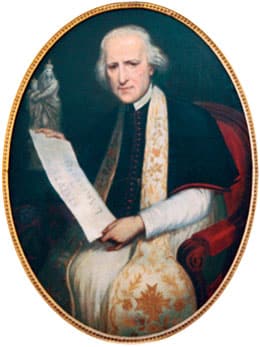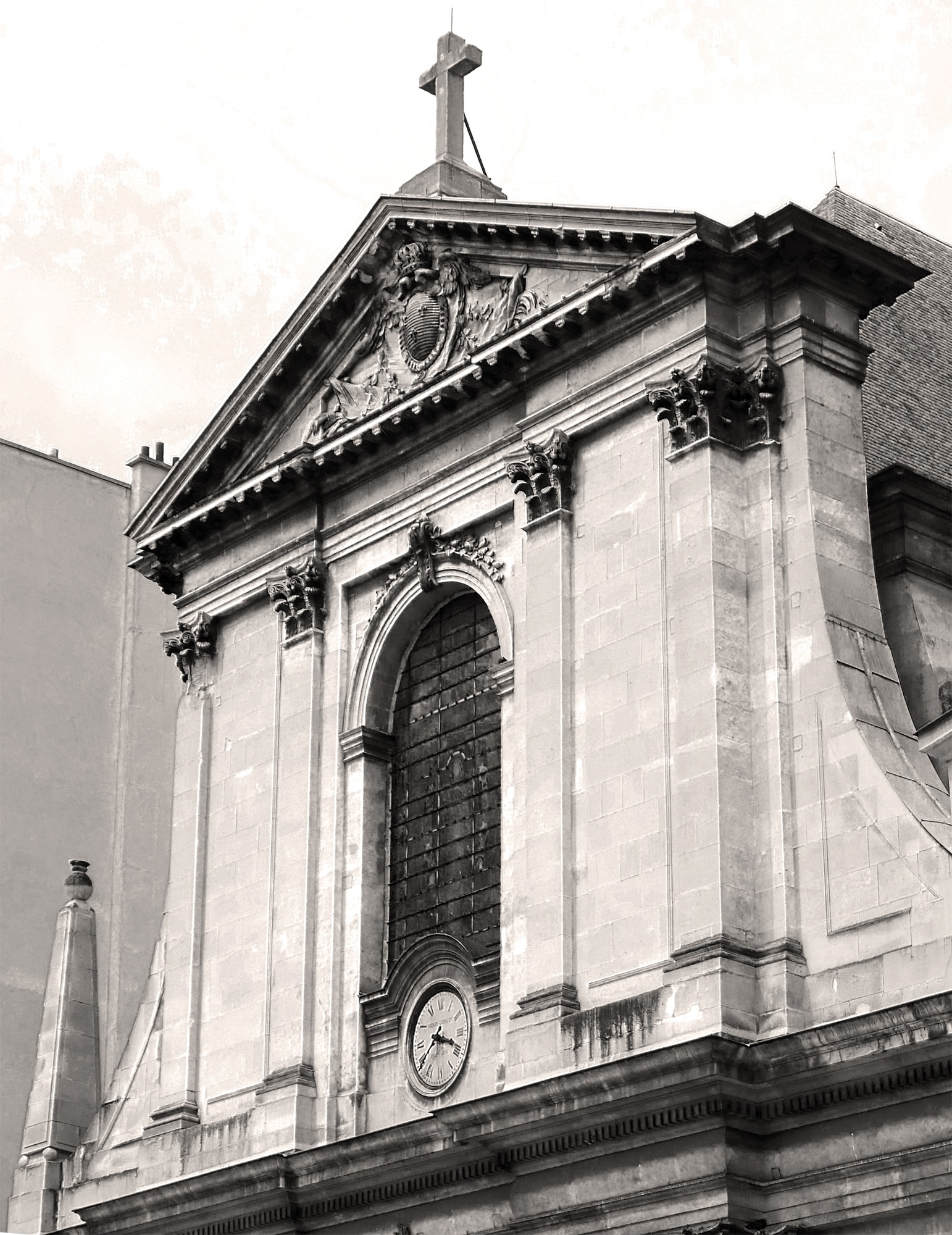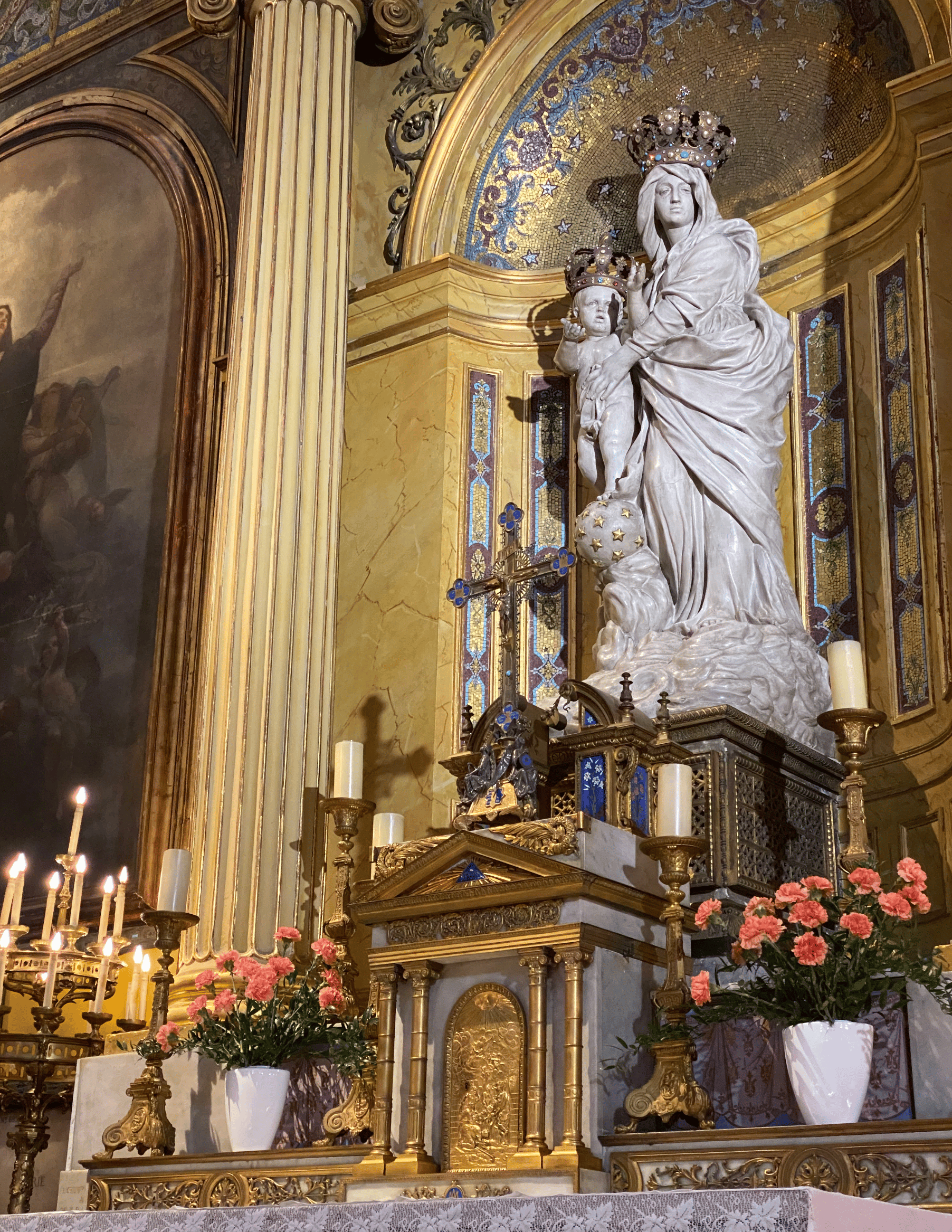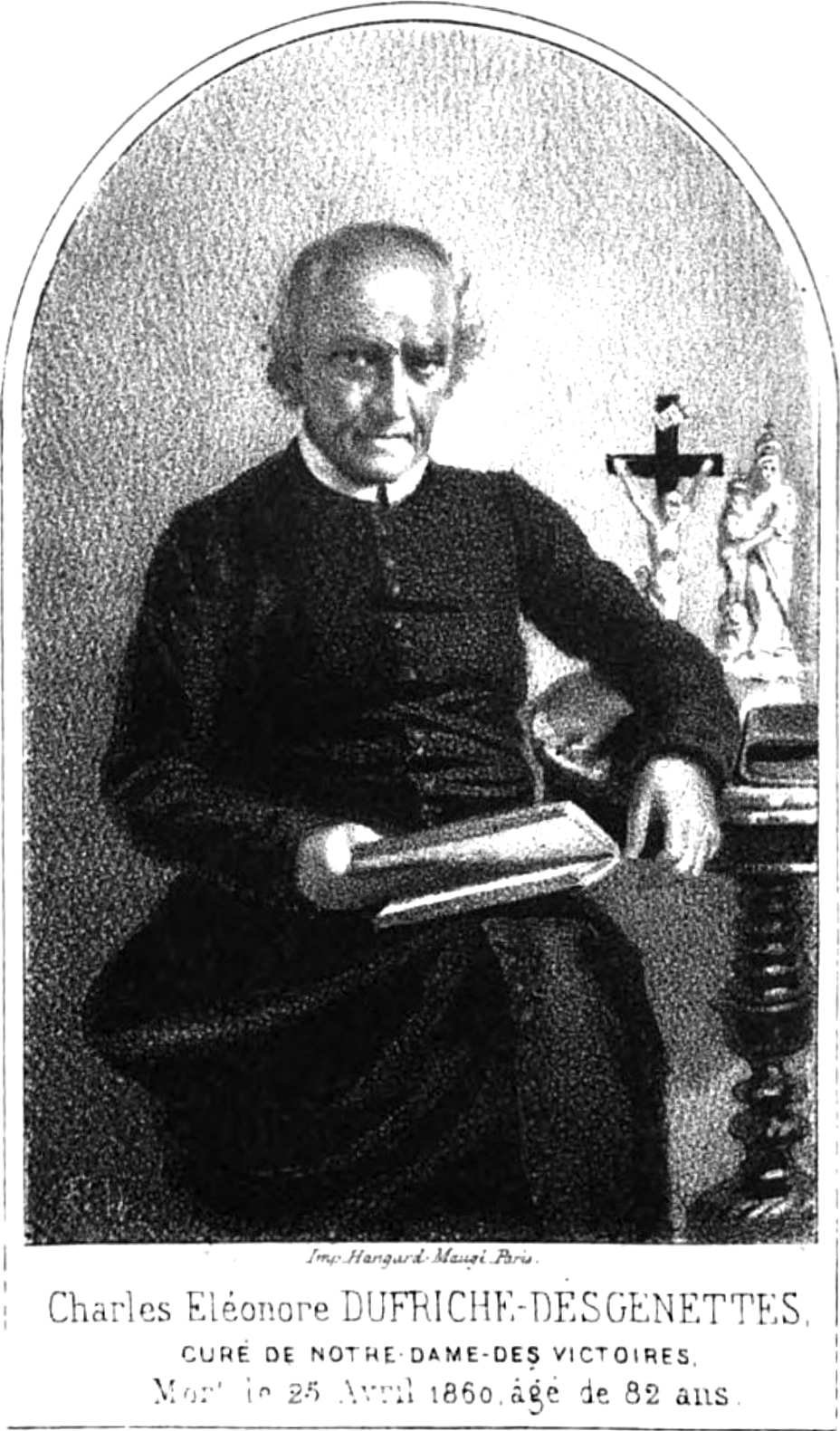The extraordinary life
OF THE HISTORICAL PARISH PRIEST OF OUR LADY OF VICTORIES
You are standing in front of the confessional where the abbot Charles Desgenettes confessed. Appointed parish priest in 1832 in a church whose parishioners had abandoned all religious practice, he made Our Lady of Victories one of the very first places of Marian pilgrimage in the world in a few years.
« It is not the Will of God; you must be a parish priest. You will be appointed parish priest before the end of the year. You will refuse and be forced to accept. You will go to a parish where you will suffer a lot but where you will do good. You will leave it after some time to go to another. »

Charles Desgenettes was born on August the 10th, 1778 in Alençon (Normandy). Gifted with a remarkable intelligence and memory, he could read at the age of 3.
Deeply religious, as a child he built small oratories in honor of the Blessed Virgin, where he went to beg her forgiveness for having hurt his mother. He wanted to become a priest and tried at all costs to correct himself.
The French Revolution broke out in 1789. He was 12 years old in 1790 when the Civil Constitution of the Clergy was voted. He was repulsed by this act. Sent to confession in his school, he refused the sacrament of Reconciliation because the priest was sworn in:
« I am brought here by force. I don’t confess to sworn priests. You are not a Catholic. You have a lot of connections with the court of Satan! »
In 1799, his father opposed his vocation to the priesthood and sent him to study math and medicine. But Charles fell seriously ill. Seeing himself dying, he vows to dedicate himself to God if he recovers.
The young man finally returned to the seminary in 1803 and was ordained a priest in 1805 for the diocese of Alençon (Normandy).
In 1815, after he had already twice refused to become a parish priest, a priest to whom he confided his desire to return to the Jesuits made this prophecy to him:
« It is not the Will of God; you must be a parish priest. You will be appointed parish priest before the end of the year. You will refuse and be forced to accept. You will go to a parish where you will suffer a lot but where you will do good. You will leave it after some time to go to another. »
The prediction came true as he was appointed the same year as parish priest in Alençon where he was not well received… The day of his installation, he entered the church escorted by the police!
After three difficult years, the parishioners finally became attached to their priest and when he fell seriously ill, they took turns at his bedside.
The abbot Desgenettes’ virtues as a pastor were praised even by the diocese of Paris, which obtained his loan in 1819.
He devoted himself to the poor and orphans of the capital and founded several works in their service, going into personal debt.
He became parish priest of Our Lady of Victories on August the 30th, 1832, at the age of 54. When he took possession of his church and walked around the neighborhood, he understood that he was entering the last stage of his life prophesied in 1815. Here is what he discovered:
« There is in Paris, this modern Babylon, a parish then almost unknown even to a great number of its inhabitants. It is located between the Palais Royal and the Bourse: its belt consists of theaters and noisy places of pleasure. This parish, dedicated to Our Lady of Victories, has lost its name with its glory; it is now known only by the expressionless name of the Church of the Little Fathers. »
The church remains deserted even on feast days. The sacraments are not administered, even at the moment of death. The poor priest preaches but no one is there to listen to him. The first Sunday there are barely 40 people at mass. This will last 4 long years.


While poor abbot Desgenettes was about to give up, something extraordinary happened on Saturday, December the 3rd, 1836.
He relates:
« I was beginning Holy Mass. I was in the first verse of the psalm when a thought came to my mind: the uselessness of my ministry in this parish. I made every effort to keep it out of my mind. I seemed to hear a voice repeating to me: « You do nothing, your ministry is useless. Look at the four years you have been here, what have you gained? Everything is lost, this people has no faith anymore. You should prudently withdraw. This thought persisted so much that it absorbed all the faculties of my mind to the point that I read, recited the prayers without understanding what I was saying.
After the Sanctus, I stopped for a moment and said to myself: « My God, what state am I in? How am I going to offer the divine Sacrifice? No sooner had I finished these words than I heard very clearly, « Consecrate your parish to the Most Holy and Immaculate Heart of Mary. » No sooner had I heard these words than I immediately recovered my calm and freedom.
Back home, he wrote the statutes of the association of the Immaculate Heart of Mary, Refuge for Fishermen, which were immediately validated by the Archbishop of Paris who encouraged him in his approach.
On December the 11th, Father Desgenettes announced during the mass, attended by only 10 people, that that evening at 7:00 p.m., he would celebrate an office to implore the Divine Mercy, through the protection of the Heart of Mary, for the grace of the conversion of fishermen.
At the appointed hour, when he arrived at the church without much hope, the priest was faced with a crowd of 400 to 500 people! Vespers was heard with indifference, but when he reached the Litany of the Blessed Virgin, the congregation redoubled their fervor, especially at the invocation « Refuge of sinners », where everyone knelt down.
The father is overwhelmed and says to the Blessed Virgin:
« O Mary, adopt this pious association. Give me as proof the conversion of Mr. Joly. I will go to his house tomorrow in your name.
Mr. Joly was the last minister of Louis XVI and was deeply atheist. He received Father Desgenettes, asked for his blessing and confessed. He was among the first to join the association. In 10 days, more than 200 people joined.
Testimonies of healings and conversions began to pour in from all over France and even from abroad.
On April the 24th, 1838, the Pope erected the association as a universal Archconfraternity.
« The Archconfraternity wages war on Satan, snatching victims from him, » says the parish priest of Our Lady of Victories.
From 1839, Father Desgenettes added the healing of the sick and the help of the afflicted to his Marian prayers:
« We could not forget that Mary is the salvation of the sick, the consolation of the afflicted and the refuge of sinners. The Mother of Mercy wants her omnipotence to be exercised in favor of all those who may be in need of it. »
The parish priest tried to decorate his church, which was bare at the time, but as the years went by, he was happy to see the walls filled with marble ex-votos, hearts and lamps. In 1853, the Pope offered crowns for the statue of the Virgin and the Child Jesus. These wreaths were stolen during the looting of the church in 1871, during the Commune.
Slowly, Father Desgenettes entered old age. On Holy Thursday of 1859, his legs could no longer support him and he was carried into the church for the last time. He died on April 25, 1859 at the age of 82. He wished to be buried at the feet of the Blessed Virgin and his wish was granted by imperial decree.
One last time, let us listen to him:
« We must love, we must pray. Mary is not only the advocate and refuge of sinners, she is also the consolation of the afflicted, the strength and support of those who suffer, the help of Christians and the good and tender mother of all men. Nothing that interests us can be indifferent to her. The sick person who invokes her often obtains through her protection the relief, the cure of his ills ».




